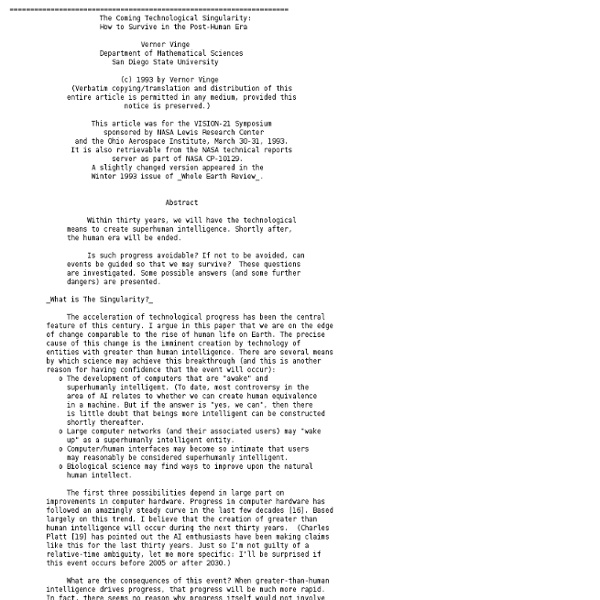



http://www-rohan.sdsu.edu/faculty/vinge/misc/singularity.html
Three Major Singularity Schools : The Singularity Institute Blog I’ve noticed that Singularity discussions seem to be splitting up into three major schools of thought: Accelerating Change, the Event Horizon, and the Intelligence Explosion. Accelerating Change:Core claim: Our intuitions about change are linear; we expect roughly as much change as has occurred in the past over our own lifetimes. But technological change feeds on itself, and therefore accelerates. Change today is faster than it was 500 years ago, which in turn is faster than it was 5000 years ago. PC AI sucks at Civilization, reads manual, starts kicking ass The Massachusetts institute of technology have been experimenting with their computers' AI. Specifically the way they deal with the meaning of words. You might think that the best way to analyse this kind of thing would be with a human to PC conversation, like in Short Circuit. That's not the case.
Vernor Vinge on the Singularity Vernor Vinge Department of Mathematical Sciences San Diego State University (c) 1993 by Vernor Vinge (This article may be reproduced for noncommercial purposes if it is copied in its entirety, including this notice.) The original version of this article was presented at the VISION-21 Symposium sponsored by NASA Lewis Research Center and the Ohio Aerospace Institute, March 30-31, 1993. A slightly changed version appeared in the Winter 1993 issue of Whole Earth Review. Within thirty years, we will have the technological means to create superhuman intelligence. Shortly after, the human era will be ended.
Singularity Summit at Stanford An Annual Conference onScience, Technology, and the Future The Singularity Summit is an annual conference on science, technology, and the future co-produced by MIRI and Singularity University. Topics explored include artificial intelligence, brain-computer interfaces, the Singularity, robotics, regenerative medicine, and big picture issues on the trajectory of human civilization. Each year, about 25 eminent speakers share their latest views over the course of two days. Turing Test [<< | Prev | Index | Next | >>] Turing Test Human: Hello Computer: Hi. Human: What's your name? Computer: Can we cut the small talk and get to something interesting? Human: Ur, ok...
Singularity Hypotheses: A Scientific and Philosophical Assessment What is the Singularity? Existential risk or cultist fantasy? Rapture of the nerds? Alvin Toffler Alvin Toffler (born October 4, 1928) is an American writer and futurist, known for his works discussing the digital revolution, communication revolution and technological singularity. He founded Toffler Associates, a management consulting company, and was a visiting scholar at the Russell Sage Foundation, visiting professor at Cornell University, faculty member of the New School for Social Research, a White House correspondent, an editor of Fortune magazine, and a business consultant.[3] Toffler is married to Heidi Toffler, also a writer and futurist. They live in the Bel Air section of Los Angeles, California, just north of Sunset Boulevard. The couple’s only child, Karen Toffler, (1954–2000), died at the age of 46 after more than a decade suffering from Guillain–Barré syndrome.[4][5]
Four Years Later By Mike Deering The date is four years from now, and the world is on the verge of something wonderful. The big news of the last twelve months is the phenomenal success of Ben Goertzel's Novamente program. It has become a super tool for solving complex problems. Singularity Network Nick Bostrom's Home Page AI Cracks Mystery of 4-Millennia-Old Code (Partially)AI Cracks Mystery of 4-Millennia-Old Code (Partially) Those of you who watched Terminator as a warning of the future may want to pack your bags: an artificial intelligence has just beaten the best human experts at a problem, one that some of them said was utterly impossible. We recommend bringing some EMP weapons, and we hear that there's a nice spot for a city near the Earth's core. The problem was that of the Indus script, writings left behind by the people of the Indus Valley four millennia ago - people thoughtless enough not to drop a dictionary into their ruins.
Agents An agent is an animate entity that is capable of doing something on purpose. That definition is broad enough to include humans and other animals, the subjects of verbs that express actions, and the computerized robots and softbots. But it depends on other words whose meanings are just as problematical: animate, capable, doing, and purpose. The task of defining those words raises questions that involve almost every other aspect of ontology. Animate. Neuro Evolving Robotic Operatives Neuro-Evolving Robotic Operatives, or NERO for short, is a unique computer game that lets you play with adapting intelligent agents hands-on. Evolve your own robot army by tuning their artificial brains for challenging tasks, then pit them against your friends' teams in online competitions! New features in NERO 2.0 include an interactive game mode called territory capture, as well as a new user interface and more extensive training tools. NERO is a result of an academic research project in artificial intelligence, based on the rtNEAT algorithm. It is also a platform for future research on intelligent agent technology.
Thinking Machine 4 Thinking Machine 4 explores the invisible, elusive nature of thought. Play chess against a transparent intelligence, its evolving thought process visible on the board before you. The artwork is an artificial intelligence program, ready to play chess with the viewer. If the viewer confronts the program, the computer's thought process is sketched on screen as it plays. A map is created from the traces of literally thousands of possible futures as the program tries to decide its best move. Those traces become a key to the invisible lines of force in the game as well as a window into the spirit of a thinking machine.